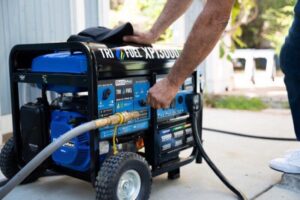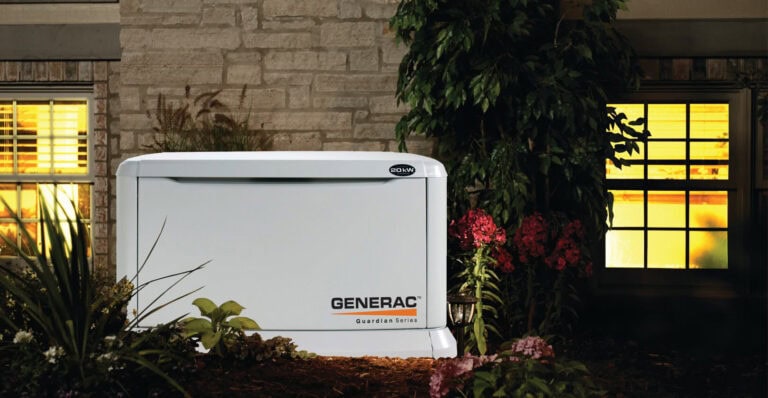Florida homeowners understand the necessity of access to a generator to keep their families comfortable during outages. When considering a generator, there are two types of generators to choose from – a portable generator, and a standby generator (permanently installed). While both options come with a host of pros and cons (check out our blog post, How to Choose the Right Sized Generator, to learn more about portable generators), a standby generator is definitely the most convenient option.

How Much Does a Standby Generator Cost?
Installing a whole house standby generator is a significant investment, and understanding the various costs involved can help you plan your budget effectively. Below is a detailed guide to the key components and associated costs, giving you a realistic estimate of the total expense.
The information provided is meant to give you a general idea of pricing – you will need a quote to provide specific costs for your project.
1. Generator Costs
- Generator Unit: The cost of the generator itself varies depending on size and power output.
- Small generators (7-10 kW): $2,500–$5,000
- Medium generators (12-20 kW): $5,000–$7,500
- Large generators (22-30 kW): $7,500–$15,000
2. Installation Costs
- Electrical Installation:
- Includes wiring, connecting the transfer switch, and integrating with the home’s electrical system.
- $2,000–$5,000
- Transfer Switch:
- Manual switch: $500–$1,000
- Automatic transfer switch (ATS): $1,500–$3,000
3. Site Preparation Costs
- Pouring a Concrete Pad:
- A sturdy foundation is required for mounting the generator. Costs vary based on the size and complexity of the pad.
- $500–$1,500
- Grading and Landscaping Adjustments:
- Necessary for uneven or sloped yards.
- $500–$2,000
4. Fuel Source Installation
- Propane Tank Installation:
- If using propane as a fuel source, you’ll need a tank installed. The size depends on your generator and power needs.
- Small (100–250 gallons): $500–$1,000
- Large (500–1,000 gallons): $1,500–$3,500
- Additional Costs: Includes running gas lines to the generator and permits.
- Gas line installation: $500–$2,000
- Permit fees: $100–$500
- If using propane as a fuel source, you’ll need a tank installed. The size depends on your generator and power needs.
- Natural Gas Connection:
- If connecting to an existing natural gas line, costs can range from $500–$2,000, depending on distance and local utility requirements.
5. Miscellaneous Costs
- Battery Backup:
- Standby generators often require a dedicated battery for automatic start.
- $200–$500
- Weatherproof Housing:
- Many generators come with enclosures, but premium weatherproof covers or enclosures may cost extra.
- $500–$1,000
- Permits and Inspections:
- Most municipalities require permits and inspections for generator installation.
- $100–$500
6. Maintenance and Operational Costs
- Routine Maintenance:
- Annual service, including oil changes, filter replacements, and system checks.
- $200–$500 per year
- Fuel Costs:
- Propane and diesel generators require a steady fuel supply, which adds to operational costs.
- Propane: $3–$5 per gallon
- Diesel: $3–$6 per gallon
- Propane and diesel generators require a steady fuel supply, which adds to operational costs.
- Extended Warranties (Optional):
- Many manufacturers offer extended warranties for added peace of mind.
- $300–$1,000
Total Cost Estimate For a Whole House Generator
Adding up the costs, here’s a rough estimate for a whole house generator installation:
| Component | Low Estimate | High Estimate |
|---|---|---|
| Generator Unit | $5,000 | $15,000 |
| Installation | $2,500 | $5,000 |
| Concrete Pad | $500 | $1,500 |
| Propane Tank & Installation | $1,000 | $5,000 |
| Electrical Setup (Transfer Switch, etc.) | $2,000 | $5,000 |
| Permits & Miscellaneous Fees | $500 | $2,000 |
| Total Estimated Cost | $11,500 | $33,500 |
Tips to Manage Whole House Generator Costs
- Compare Quotes: Get multiple quotes from licensed contractors to find the best price.
- Consider a Smaller Generator: If full-house coverage isn’t necessary, a portable generator can save money.
- Check for Incentives: Some states offer rebates or tax incentives for installing standby generators.
Is It Worth Getting a Whole House Generator?
If you live in an area like Florida where storms and outages are common, yes — a whole-house generator can be a smart investment. It automatically powers your home during outages, keeping lights, appliances, and AC running safely. While installation can cost several thousand dollars, the peace of mind, comfort, and protection it offers during extended power loss often make it worth it.
Before choosing a stand-by generator, check with your HOA to determine if you will need approval for installation, if applicable.
Investing in a standby generator provides peace of mind during power outages, and while the upfront cost is substantial, the benefits of reliability and comfort make it a worthwhile addition to your home.
Learn more about generators:

